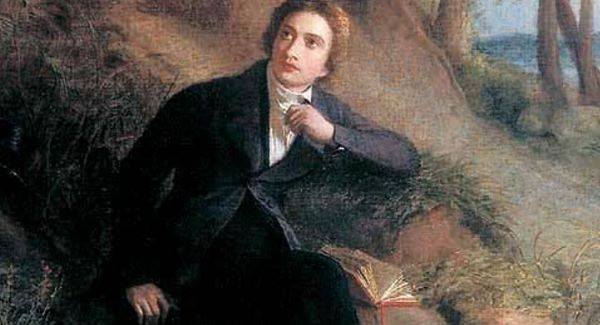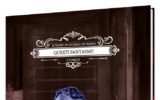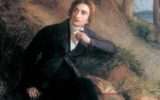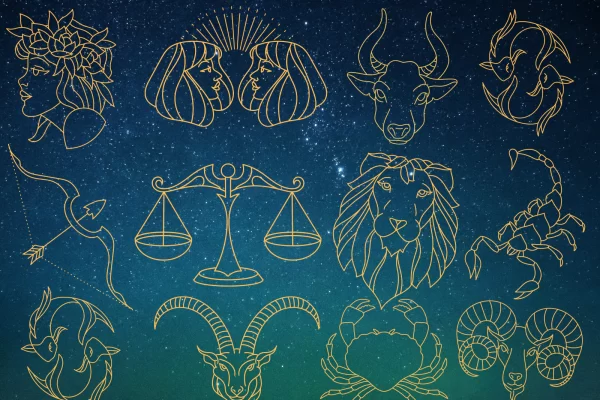An excursus towards Keats’s letters shows us joys and pains that animate his mood. Poetry was his greatest pain but at the same time also his greatest reason to live.
In Keats’s life Thought and Poetry[1] interlace, merge and reject each other in the bustle of life. A disturbed, sometimes irritable mood, emerges from letters to friends and family. Moments of joy and excitement alternate themselves with dark one, almost reaching depression, that take him away from everything and everyone, also from his closest friends. In his letters, Keats often apologizes his friends for his coldness and indifference connected to long periods where Nothing has the upper hand: no passions, no affection, until the moment even when he doubts about himself and about the genuineness of his feelings.
These moods irritate him, first of all because he cannot concentrate on writing as he would like to: «So now I revoke my Promise of finishing my Poem by the Autumn which I should have done had I gone on as I have done—but I cannot write while my spirit is fevered in a contrary direction». [2]After one year in a letter to his friend Bailey dated 1st June 1818, Keats writes: «I am in that temper that if I were under water I would scarcely kick to come up to the top—I know very well ’tis all nonsense—In a short time I hope I shall be in a temper to feel sensibly your mention of my book. In vain have I waited till Monday to have any Interest in that or anything else. I feel no spur at my Brother’s going to America, and am almost stony-hearted about his wedding ».[3]
But for Keats living without Poetry is impossible; Poetry is part of Keats’s life and he completely devotes himself to it. Why? Because Keats’s idea of Poetry , and of Life, is entirely different from that of his contemporaries. Keats’s Poetry is not an ethical and useful Poetry and does not have an educational purpose. Keats takes position against this concept of Poetry and offers one less rational, free from Thought, as it is more spontaneous, impulsive, nearly primordial. As he will write to Baily in a letter dated November 1817: «O for a life of Sensations rather than a life of Thoughts!»[4].
In this life of Sensations, the Poet loses himself, his identity and abandons his Ego. Keats’s Poetry is not focused on the Ego but on losing; it: this is a Poetry that tends to Oblivion and Imagination. In Another letter to Baily, written before, he says: «Besides, a long poem is a test of invention, which I take to be the Polar of the Poetry, as Fancy is the Sails – and Imagination the rudder». [5]
The letters to his brothers George and Tom are a rich source of information that help us to explore Keats’s mood. In these letters the poet explains his concept of «Negative Capability», a modern and present idea, that consists of the capability to live in the uncertainty, to accept waiting and bear«(…) without any irritable reaching after fact and reason ».[6]
Keats thinks that this is the quality necessary to become a successful man, especially in literature. A man should be able to cancel himself, to cancel his own Ego, to enter in shadow of uncertainty, to open himself to the New, to the unknown, to changes, as well as to the Others and take part in Other’s life, to feel together with the Others trough the Imagination: «…If a sparrow come before my Window, I take part in its existence and pick about the gravel » [7].
So the poet has the capability to be nothing and at the same time to be everything, he is a chameleon poet as Keats says. The Unknown or the Others are not a danger, but an opportunity for the Poet; opportunity to know what is different from us, what we don’t know, what scares us. In this Oblivion it is the poet’s mood that navigates. And the word? What function has the word in this bustle of sensations and imaginations? The word has a key role because it is able to accept what is unknown, to welcome the Others, and does it naturally. The Poet should leave himself to be found: «That if poetry comes not as naturally as the leaves to a tree, it had better not come at all » [8]. And precisely the passivity is the key of poetic creation: open oneself to the unknown, re-elaborate using imagination and create. This is John Keats, that his genius and his tender love for Nature and entire Human race.
Our journey re-discovering John Keats goes on and, throughout his letters to his love Fanny Brawne, we will to discover other traits of Keats’s thought, of his link with poetry and Human Race.
Sources:
– NADIA FUSINI, Keats Lettere sulla poesia, Oscar Mondadori
– LETTERS OF JOHN KEATS TO HIS FAMILY AND FRIENDS, edited by Sidney Colvin, London 1891
[1]Some words in this article (in capital letters) are the same that Keatswrote in his letters tounderline the importance they had in his Thought.
[2] Letter to Benjamin Robert Haydon May 1817 – http://www.gutenberg.org/files/35698/35698-h/35698-h.htm#Page_13
[3] Letter to Benjamin Robert Haydon 1st June 1817 – http://www.gutenberg.org/files/35698/35698-h/35698-h.htm#Page_109 (page 109-111)
[4] Letter to Benjamin Bailey 22ndNovember 1817 pag.40https://archive.org/stream/lettersofjohnkea00keatiala#page/42/mode/2up
[5] Letter to Benjamin Bailey 8th October 1817 p.34 – https://archive.org/stream/lettersofjohnkea00keatiala#page/32/mode/2up
[6]Letter to George and Thomas Keats 22nd December 1817
[7]Letter to Benjamin Bailey22th November 1817 pag.43 – https://archive.org/stream/lettersofjohnkea00keatiala#page/42/mode/2up
[8] Letter to John Taylor 27th February 1818 – http://www.gutenberg.org/files/35698/35698-h/35698-h.htm#Page_77























